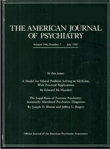Failure of nonlinear models of drinking history variables to predict neuropsychological performance in alcoholics
Abstract
To test whether the relationship between drinking parameters and cognitive functioning can be visualized as a curvilinear surface (rather than as a line, which more traditional regression equations presuppose), the authors tested 84 recently detoxified and 72 longer- term abstinent alcoholic men with the Halstead-Reitan battery. Quadratic statistical models did not predict test performance in the first group; a few predictions were found in the second. When the multiple correlation was adjusted for number of cases and variables, the "nonlinear" results were statistically no more significant than those of simpler linear models. It is concluded that drinking history does not readily explain cognitive findings among sober alcoholics and that polynomial models can produce inflated correlation coefficients.
Access content
To read the fulltext, please use one of the options below to sign in or purchase access.- Personal login
- Institutional Login
- Sign in via OpenAthens
- Register for access
-
Please login/register if you wish to pair your device and check access availability.
Not a subscriber?
PsychiatryOnline subscription options offer access to the DSM-5 library, books, journals, CME, and patient resources. This all-in-one virtual library provides psychiatrists and mental health professionals with key resources for diagnosis, treatment, research, and professional development.
Need more help? PsychiatryOnline Customer Service may be reached by emailing [email protected] or by calling 800-368-5777 (in the U.S.) or 703-907-7322 (outside the U.S.).



